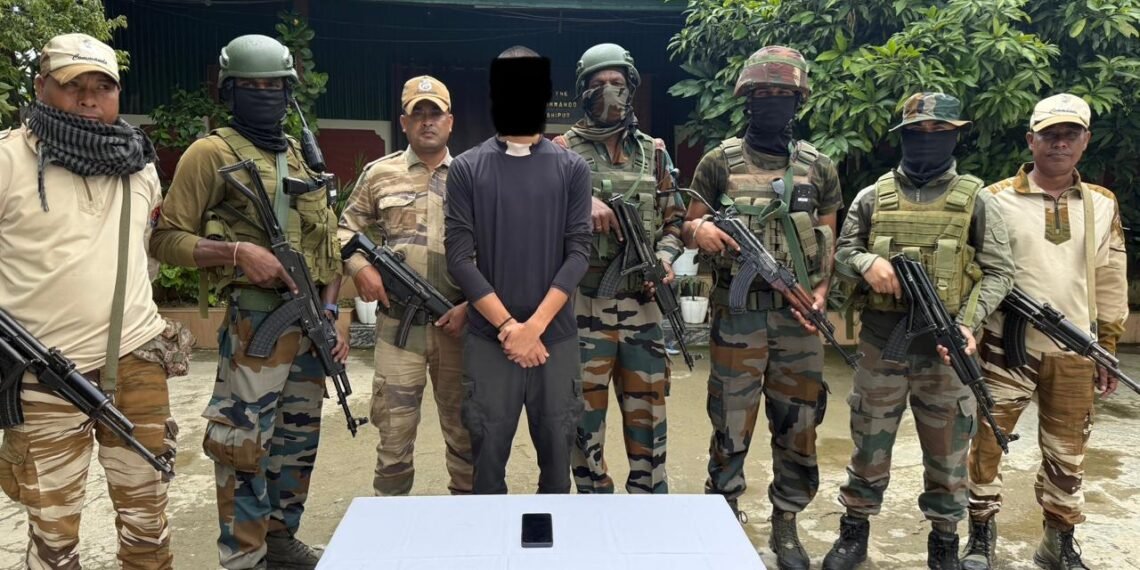Two alleged fraudsters were shot and assaulted for impersonating insurgents and extorting civilians in Imphal. With the state unable to contain the menace, underground groups have begun delivering brutal street justice.
BY PC Bureau
July 17, 2025–A militant group has claimed responsibility for the July 14 shootout in Imphal, stating that the victims had forged its letterhead to extort money from traders in the city. The episode has once again thrown a harsh spotlight on the deep-rooted extortion racket in the Manipur capital, where insurgent groups continue to operate with impunity while the police struggle to assert control.
The shooting incident occurred between Sawombung and Phaknung in Imphal East. According to the National Revolutionary Front Manipur (NRFM), a banned insurgent outfit, the two victims—Soram Girish, 26, and Kumam Jemelia, 25—had been impersonating members of the group and using its name to collect illegal “donations” from local businesses and government employees. Girish was shot in the leg, and Jemelia was physically assaulted. Both were taken to RIMS Hospital for treatment. While Jemelia has been discharged, Girish remains hospitalized.
READ: 1 Killed in Assam Eviction Drive Clash in Goalpara’s Forest
On July 12, just two days before the incident, hundreds of shopkeepers and business owners from Khuman Lampak and Chingmeirong held a rare public sit-in protest. These commercial hubs, among the most sensitive areas in Imphal, have long been vulnerable to extortion. The protest signaled rising public anger and frustration over the failure of law enforcement agencies to protect civilians from intimidation and financial coercion by armed groups. Protesters accused militant outfits of routinely demanding payments ranging from ₹10,000 to as high as ₹5 lakh, depending on the scale of the business.
The NRFM’s public admission of the July 14 attack marks a dangerous evolution in Manipur’s underground economy. Once focused primarily on extortion and insurgent activities, some militant groups are now positioning themselves as vigilantes, using violence to decide who gets to extort and who doesn’t.
READ: AI 171 Crash: Scapegoating or Truth? WSJ Report Blames Pilot
The NRFM, formed in the early 2000s, is a Meitei insurgent outfit advocating for an independent Manipur. Though relatively low-profile compared to more established groups like the United National Liberation Front (UNLF) and the People’s Revolutionary Party of Kangleipak (PREPAK), NRFM has long relied on extortion, threats, and targeted violence as tools of influence. The group is banned under the Unlawful Activities (Prevention) Act. Several of its senior leaders have been neutralized over the years, but its operational wings remain active, particularly in Imphal East and Thoubal districts.
Business owners & shopkeepers from Khuman Lampak & Chingmeirong—two of #Imphal‘s most sensitive areas—staged a sit-in protest on June 11 against continued demand for illegal “donations”
by gangs exploiting chaos. People must unite against extortion.pic.twitter.com/itBDPSZRck— Inside Manipur (@Inside_Manipur) July 15, 2025
Manipur’s extortion economy is extensive and complex. Intelligence sources estimate that over a dozen militant outfits operate in the valley region, with at least six of them directly involved in large-scale extortion. Targets range from private businesses and contractors to school heads and government employees. The estimated annual haul in Imphal alone is believed to exceed ₹25–30 crore.
Groups like the People’s Liberation Army (PLA), the Kangleipak Communist Party (KCP), and PREPAK are considered some of the most dominant players in the extortion network. Their methods vary—threat letters, phone calls, late-night visits—but the outcome is always the same: payment under fear of reprisal.
READ: Bihar Roll Revision Blowup: Why the ECI Is Under Fire (Part-1)
The state’s law enforcement agencies remain largely ineffective in breaking this network. Despite occasional arrests, including 11 alleged extortionists over the past month, locals say these detentions only target minor foot soldiers and leave the real operatives untouched. Many business owners are unwilling to file official complaints, fearing that doing so will make them further targets.
The current climate marks a dangerous shift. What was once a battle between the state and insurgent groups has now morphed into a landscape where militant outfits act as both perpetrator and judge—punishing those who challenge their authority, even over criminal acts like extortion.
While civic bodies and rights groups have repeatedly called for targeted intervention—including the creation of an anti-extortion task force, witness protection schemes, and financial surveillance of militant funding channels—there has been little visible political will to confront the problem head-on.













